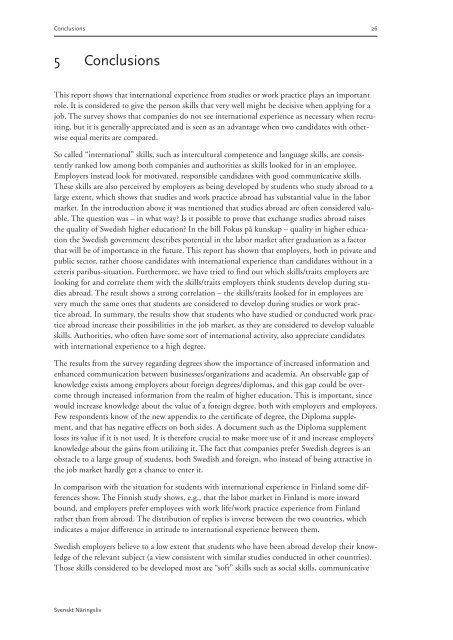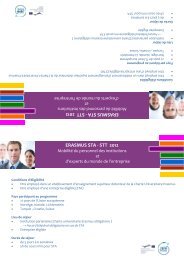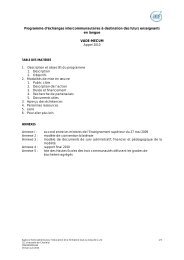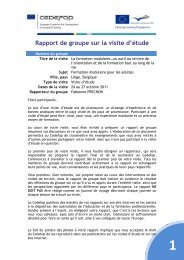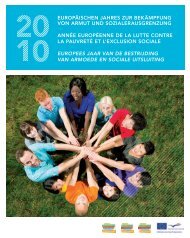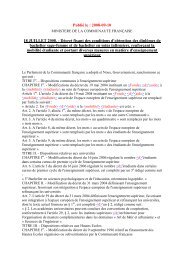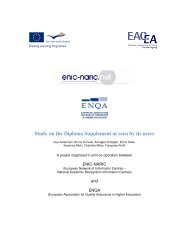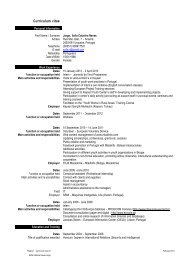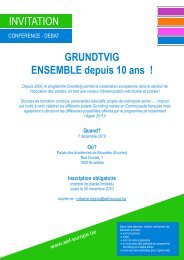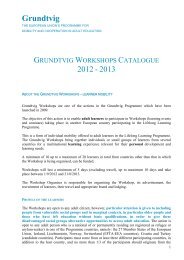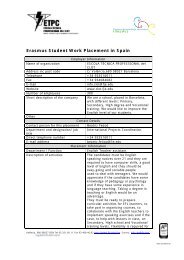Employers' view on studies abroad - Svenskt Näringsliv
Employers' view on studies abroad - Svenskt Näringsliv
Employers' view on studies abroad - Svenskt Näringsliv
Create successful ePaper yourself
Turn your PDF publications into a flip-book with our unique Google optimized e-Paper software.
C<strong>on</strong>clusi<strong>on</strong>s 26<br />
5 C<strong>on</strong>clusi<strong>on</strong>s<br />
This report shows that internati<strong>on</strong>al experience from <strong>studies</strong> or work practice plays an important<br />
role. It is c<strong>on</strong>sidered to give the pers<strong>on</strong> skills that very well might be decisive when applying for a<br />
job. The survey shows that companies do not see internati<strong>on</strong>al experience as necessary when recruiting,<br />
but it is generally appreciated and is seen as an advantage when two candidates with otherwise<br />
equal merits are compared.<br />
So called “internati<strong>on</strong>al” skills, such as intercultural competence and language skills, are c<strong>on</strong>sistently<br />
ranked low am<strong>on</strong>g both companies and authorities as skills looked for in an employee.<br />
Employers instead look for motivated, resp<strong>on</strong>sible candidates with good communicative skills.<br />
These skills are also perceived by employers as being developed by students who study <strong>abroad</strong> to a<br />
large extent, which shows that <strong>studies</strong> and work practice <strong>abroad</strong> has substantial value in the labor<br />
market. In the introducti<strong>on</strong> above it was menti<strong>on</strong>ed that <strong>studies</strong> <strong>abroad</strong> are often c<strong>on</strong>sidered valuable.<br />
The questi<strong>on</strong> was – in what way? Is it possible to prove that exchange <strong>studies</strong> <strong>abroad</strong> raises<br />
the quality of Swedish higher educati<strong>on</strong>? In the bill Fokus på kunskap – quality in higher educati<strong>on</strong><br />
the Swedish government describes potential in the labor market after graduati<strong>on</strong> as a factor<br />
that will be of importance in the future. This report has shown that employers, both in private and<br />
public sector, rather choose candidates with internati<strong>on</strong>al experience than candidates without in a<br />
ceteris paribus-situati<strong>on</strong>. Furthermore, we have tried to find out which skills/traits employers are<br />
looking for and correlate them with the skills/traits employers think students develop during <strong>studies</strong><br />
<strong>abroad</strong>. The result shows a str<strong>on</strong>g correlati<strong>on</strong> – the skills/traits looked for in employees are<br />
very much the same <strong>on</strong>es that students are c<strong>on</strong>sidered to develop during <strong>studies</strong> or work practice<br />
<strong>abroad</strong>. In summary, the results show that students who have studied or c<strong>on</strong>ducted work practice<br />
<strong>abroad</strong> increase their possibilities in the job market, as they are c<strong>on</strong>sidered to develop valuable<br />
skills. Authorities, who often have some sort of internati<strong>on</strong>al activity, also appreciate candidates<br />
with internati<strong>on</strong>al experience to a high degree.<br />
The results from the survey regarding degrees show the importance of increased informati<strong>on</strong> and<br />
enhanced communicati<strong>on</strong> between businesses/organizati<strong>on</strong>s and academia. An observable gap of<br />
knowledge exists am<strong>on</strong>g employers about foreign degrees/diplomas, and this gap could be overcome<br />
through increased informati<strong>on</strong> from the realm of higher educati<strong>on</strong>. This is important, since<br />
would increase knowledge about the value of a foreign degree, both with employers and employees.<br />
Few resp<strong>on</strong>dents know of the new appendix to the certificate of degree, the Diploma supplement,<br />
and that has negative effects <strong>on</strong> both sides. A document such as the Diploma supplement<br />
loses its value if it is not used. It is therefore crucial to make more use of it and increase employers’<br />
knowledge about the gains from utilizing it. The fact that companies prefer Swedish degrees is an<br />
obstacle to a large group of students, both Swedish and foreign, who instead of being attractive in<br />
the job market hardly get a chance to enter it.<br />
In comparis<strong>on</strong> with the situati<strong>on</strong> for students with internati<strong>on</strong>al experience in Finland some differences<br />
show. The Finnish study shows, e.g., that the labor market in Finland is more inward<br />
bound, and employers prefer employees with work life/work practice experience from Finland<br />
rather than from <strong>abroad</strong>. The distributi<strong>on</strong> of replies is inverse between the two countries, which<br />
indicates a major difference in attitude to internati<strong>on</strong>al experience between them.<br />
Swedish employers believe to a low extent that students who have been <strong>abroad</strong> develop their knowledge<br />
of the relevant subject (a <str<strong>on</strong>g>view</str<strong>on</strong>g> c<strong>on</strong>sistent with similar <strong>studies</strong> c<strong>on</strong>ducted in other countries).<br />
Those skills c<strong>on</strong>sidered to be developed most are “soft” skills such as social skills, communicative<br />
<strong>Svenskt</strong> Näringsliv


